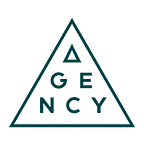Why “how might we” is failing you
Why we always put more focus on hypotheses over “how might we” statements and why we think that’s important
If you’ve ever participated in any form of design thinking,
you’ll have run into ‘how might we’ statements (HMWs).
We use HMWs at Agency — they’re a great tool to help set the stage for generative thinking. They’re an amazing way to engage anyone from any discipline to think beyond their day jobs and everyday responsibilities, and to think BIG and differently.
A few years ago, however, we started re-examining the design thinking process, trying to understand why it so often ended up in unexceptionable ideas that are hard to bring back down to reality. A large part of the problem, we realised, are HMW statements. The problem with How Might We statements is that they lack accountability.
Having done a lot of research to get you ready for idea generation, it’s natural to get excited about big, bold, audacious HMW statements that feel like they’re going to push you way out of the box.
But have you baked something into your process to make sure you’re accountable to your research findings? How do you make sure that the awesome ideas you generate, when broken down into something that can be done TODAY, are still true to the problem you are trying to solve — the one that you uncovered in your initial research?
Accountability in design thinking was never really baked in. It was always assumed that it would happen, but never designed into the process. So at Agency, we started to actively put more focus on the design hypothesis stage at the end of our research. We’ve made it a pre-requisite before jumping into design and generation.
So, what makes a good design hypothesis?
Learning to create design hypotheses is a core skill to develop early. It will carry you through many tough design moments. Being hypothesis-driven is one of the most overlooked aspects of being a good designer.
A design hypothesis should consider the insight that drives it, the core proposition of the outcome, the value that the proposition creates, and measurable criteria for its success.
It’s about being clear and committing to why you’re making design decisions before you actually start making them.
A design hypothesis is a statement that can be tested through iterative prototyping. It usually predicts a relationship between two or more variables.
The two primary features of a design hypothesis are testability and falsifiability. You should be able to construct “if… then” statements that clearly lay out the results you need to see in your experiments, and the action you’ll take if you don’t get those results.
A good design hypothesis is…
Rooted in your research and stories
Clear about the potential implications of your insights
A point-of-view, not a statement of truth
A statement you can agnostically design against
Something you can design against to test
Easy for others to understand
A good design hypothesis isn’t…
Disconnected from your research and untraceable
Difficult to move forward from
A statement of fact
Decisive in its outcome
Something that you cannot test through design
Overly complex in content and language
We hope with more designers embracing design hypotheses as part of their design flow, we can create a more accountable transition between the research and design phases of the design thinking process.
We wanted to share a simple tool that we use ourselves at the end of the synthesis stage. You can find the template for it here on the Miroverse:
For examples of how design hypotheses have helped us develop successful outcomes, please visit Agency’s website. Here, we talk about how we used design thinking and design hypotheses to re-invent dormitories for Singapore’s migrant workers. And here, you can read about how we designed a more satisfying and rewarding insurance experience for policy holders.
